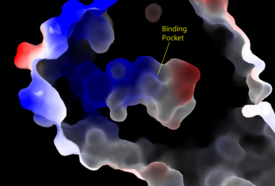We apologize for Proteopedia being slow to respond. For the past two years, a new implementation of Proteopedia has been being built. Soon, it will replace this 18-year old system. All existing content will be moved to the new system at a date that will be announced here.
Sandbox Reserved 1789
From Proteopedia
(Difference between revisions)
| Line 10: | Line 10: | ||
== Introduction == | == Introduction == | ||
| - | '' | + | |
| - | + | <scene name='95/952718/Zoom_out/1'>SHOC2-PP1C-MRAS</scene> (SMP) is a ternary holophosphotase complex formed by the individual proteins: SHOC2, PP1C, and MRAS. The SMP complex is involved in signaling the initiation of MAPK pathways, which is responsible for cellular growth and development, cell proliferation, and apoptosis (cite 1). Formation of this complex begins with an extracellular signal binding to a membrane embedded receptor [https://www.ncbi.nlm.nih.gov/pmc/articles/PMC2536775/. tyrosine kinase receptor(RTK)] <ref name="Hauseman"/>. This causes membrane-bound MRAS to exchange GDP for GTP. Initiating the SMP complex formation at the plasma membrane consists of the SHOC2 and PP1C binding first. When the MRAS exchanges GDP to GTP, it then assembles with the combined SHOC2 and PP1C. Based on MRAS targeting, PP1C catalyzes the dephosphorylation of the N-terminal phosphoserine (NTpS) on the [https://www.ncbi.nlm.nih.gov/pmc/articles/PMC3128629/. RAF complex] leading to the amplification of MAPK signaling <ref name="Hauseman"/>. In a normal cell, this would regulate cell proliferation but dysfunction in the ternary complex has shown signs to lead to tumor formation due to unregulated cell growth <ref name="Hauseman"/>. | |
| - | + | ||
[[Image:Mechanism.png|200px|center|thumb|Figure 1: Mechanism for Shoc2-MRAS-PP1C]] | [[Image:Mechanism.png|200px|center|thumb|Figure 1: Mechanism for Shoc2-MRAS-PP1C]] | ||
Revision as of 17:21, 14 April 2023
This page, as it appeared on June 14, 2016, was featured in this article in the journal Biochemistry and Molecular Biology Education.
SHOC2-PP1C-MRAS
| |||||||||||
Student Contributors
Madeline Gilbert Inaya Patel Rushda Hussein



